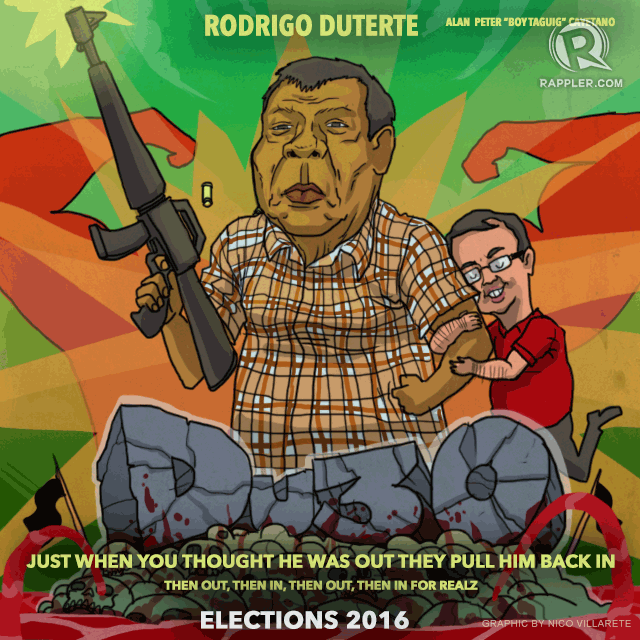For the first time in the post-Marcos years, a candidate has taken the route of substitution to run for president. After months of publicly displaying his indecision, swinging like a pendulum, Rodrigo Duterte officially joined the race: he filed his certificate of candidacy (COC) Friday, November 27.
In the past, substitution was resorted to when misfortune – death, accident – befell candidates or something unexpected happened that made it difficult for them to campaign. Political parties thus chose their benchwarmers or second-liners to fill in the vacuum.
But the case of PDP-Laban is different. Its candidate for president, Martin Diño, who is an unknown in national politics, filed a messy COC, showing lack of thoroughness and seriousness of purpose. He withdrew as the Commission on Elections (Comelec) was considering declaring him a nuisance candidate.
Voila! This paved the way for PDP-Laban to field the Davao City mayor who, in the course of his listening tour cum campaign, dropped broad hints about running and what he intended to do if he were president. He spoke before organized groups, danced on TV, gave interviews to the media, and titillated his followers with cliff-hanger pronouncements about his plans.
But he said he had decided not to run, after all, because of his age (70) and objections from his family.
One thing, however, changed all this: the Senate Electoral Tribunal decision throwing out the disqualification case against Senator Grace Poe because majority said she is a natural-born Filipino.

The legal soundness of whether Duterte can substitute for Diño has yet to be decided by the Comelec. If the poll body resolves the question that hangs thick in the air in favor of Duterte, then this would set a precedent.
Those aspiring for the presidency can now use substitution as part of a strategy rather than as a legitimate recourse, violating the spirit of the law. That’s an unwelcome addition to the toolkit of our already wayward politics.
There are other implications.
In his bid for the presidency, Duterte is capitalizing on a leading candidate’s deficiencies. He is out to fight Poe, he said, because this country cannot and should not have a president who does not meet a basic eligibility requirement. “Give me an Ifugao, Badjao. Give me a plumber, a carpenter, or an accountant as long as they are Filipino,” he said. “Don’t give me someone who is not Filipino.”
But two things arise here.
One, Duterte is doing exactly what his nemesis is doing. His candidacy is surrounded by murky substitution circumstances, as if he wants to game the system. Just as Poe has decided to run despite questions on her residency, she appears confident of winning it, backed by her surge in popularity.
Both candidates' behavior show how much they are part of our political culture that has little regard for rules, blurred by porous legal boundaries.
Two, if Poe is found to be amiss in her residency requirement or her citizenship (the case is bound to reach the Supreme Court) and is disqualified, does this mean that Duterte loses his raison d’etre for running? Will he back out? He is not beyond doing this as he flip-flopped his way into declaring his candidacy.
Of course, there’s the platform, what Duterte stands for, beyond his objections to Poe. This deserves hard scrutiny.
Of all the declared presidential candidates, Duterte is the only one who has openly talked about his preference to rule like a dictator, closing down Congress if it turns out uncooperative, and solving criminality by killing the bad guys. He has attracted a horde of followers eager for a strong leader to deliver quick fixes.
In this sense, he could be a game changer because he will make democracy and its future in the Philippines part of the campaign discourse.
But, for now, we await the verdict of the Comelec.– Rappler.com